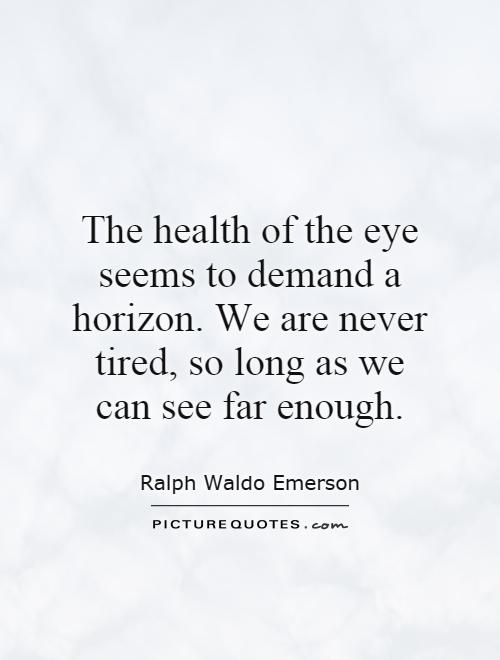The health of the eye seems to demand a horizon. We are never tired, so long as we can see far enough

The health of the eye seems to demand a horizon. We are never tired, so long as we can see far enough
Ralph Waldo Emerson, a renowned American essayist, poet, and philosopher, was known for his profound insights into nature, self-reliance, and the interconnectedness of all things. One of his most famous quotes, "The health of the eye seems to demand a horizon. We are never tired, so long as we can see far enough," speaks to the importance of vision, both literal and metaphorical, in our lives.Emerson believed that the health of the eye, or our ability to see clearly and perceive the world around us, is essential for our overall well-being. Just as our physical eyes require a horizon to focus on in order to function properly, our minds and spirits also need a sense of direction and purpose to thrive. Without a clear vision of where we are going or what we are striving for, we can easily become lost, disoriented, and fatigued.
Emerson's emphasis on the horizon as a symbol of possibility and potential reflects his belief in the power of imagination and aspiration. By looking beyond our immediate surroundings and limitations, we can expand our horizons and open ourselves up to new opportunities, experiences, and perspectives. The horizon represents the endless possibilities that lie ahead, waiting to be explored and discovered.
Emerson also suggests that the act of seeing far enough, of stretching our vision beyond the confines of our comfort zones and familiar surroundings, can invigorate and energize us. When we have a clear view of the horizon, we are inspired to keep moving forward, to keep striving for greater heights and deeper insights. The horizon becomes a source of motivation and renewal, reminding us that there is always more to see, learn, and experience in the world.












 Friendship Quotes
Friendship Quotes Love Quotes
Love Quotes Life Quotes
Life Quotes Funny Quotes
Funny Quotes Motivational Quotes
Motivational Quotes Inspirational Quotes
Inspirational Quotes